农业科技英语翻译
农业科学专业英语词汇大全了解农业科学领域的专业术语和农作物栽培技术
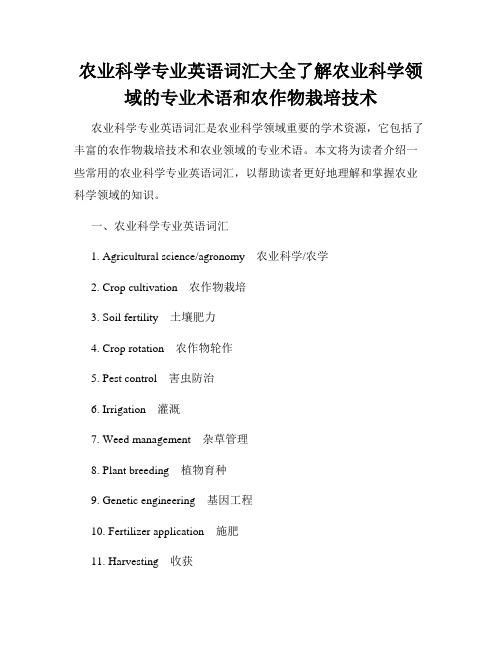
农业科学专业英语词汇大全了解农业科学领域的专业术语和农作物栽培技术农业科学专业英语词汇是农业科学领域重要的学术资源,它包括了丰富的农作物栽培技术和农业领域的专业术语。
本文将为读者介绍一些常用的农业科学专业英语词汇,以帮助读者更好地理解和掌握农业科学领域的知识。
一、农业科学专业英语词汇1. Agricultural science/agronomy 农业科学/农学2. Crop cultivation 农作物栽培3. Soil fertility 土壤肥力4. Crop rotation 农作物轮作5. Pest control 害虫防治6. Irrigation 灌溉7. Weed management 杂草管理8. Plant breeding 植物育种9. Genetic engineering 基因工程10. Fertilizer application 施肥11. Harvesting 收获12. Silage making 青贮制作13. Livestock breeding 畜牧养殖14. Dairy farming 奶牛养殖15. Poultry farming 家禽养殖16. Aquaculture 水产养殖17. Veterinary medicine 兽医学18. Agribusiness 农业经营19. Sustainable agriculture 可持续农业20. Organic farming 有机农业二、农作物栽培技术1. Soil preparation 土壤准备Soil preparation involves clearing the land, removing weeds and debris, and loosening the soil to improve its structure and drainage.2. Seed selection 种子选择Seed selection is an important step in crop cultivation. Farmers should choose high-quality seeds that are resistant to diseases and pests, and have high yield potential.3. Planting 种植Planting refers to the process of sowing seeds or transplanting seedlings into the soil. It is essential to provide the right spacing and depth for optimal plant growth.4. Fertilization 施肥Fertilization is the application of nutrients to the soil to provide essential elements for plant growth. It can be done through organic or inorganic fertilizers, depending on the specific nutrient requirements of the crop.5. Weed control 杂草防治Weeds compete with crops for nutrients, water, and sunlight. Effective weed control methods include manual weeding, the use of herbicides, and mulching to suppress weed growth.6. Pest management 害虫管理Pests can cause significant damage to crops. Integrated pest management techniques, such as biological control, cultural practices, and the judicious use of pesticides, help minimize pest damage while protecting the environment.7. Disease prevention 病害预防Crop diseases can reduce yield and quality. Disease prevention involves crop rotation, use of disease-resistant varieties, proper sanitation, and timely application of fungicides if necessary.8. Irrigation 灌溉Irrigation is essential for crop growth in areas with insufficient rainfall. It involves providing the right amount of water at the right time to ensure optimal plant health and productivity.9. Harvesting 收获Harvesting is the process of gathering mature crops for consumption or further processing. It involves careful timing to ensure maximum yield and quality.10. Storage and processing 储存和加工Proper storage and processing ensure that harvested crops remain fresh and maintain their nutritional value. This may involve drying, curing, canning, or freezing, depending on the specific crop.结语本文介绍了一些常用的农业科学专业英语词汇和农作物栽培技术,希望能帮助读者增加对农业科学领域的理解和掌握。
农业科技英语的语言特点与翻译

农业科技英语的语言特点与翻译农业科技英语(Agricultural Science and Technology English)是指与农业科技相关的英语词汇、术语和表达方式。
农业科技英语作为一种专门用途的英语,具有其独特的语言特点,并且在翻译时需要注意其特殊性。
以下是农业科技英语的语言特点及相关翻译问题的一些讨论:1.专业性质:农业科技英语是一种专门用途的英语,在其中涵盖了大量农业科技领域的术语和概念。
这些术语和概念在翻译时需要准确地表达其专业含义,以保证信息的准确性和可理解性。
例如,"sustainable agriculture"(可持续农业)是农业科技中一个重要的概念。
在翻译时,需要理解其涵义并选择准确的表达方式,以确保传达出可持续农业的概念和原则。
2.术语的丰富性与多样性:农业科技英语中的术语比较丰富多样,大部分术语都与农作物、养殖、农业生产以及农业技术相关。
这就需要翻译人员在翻译时对农业科技领域具有一定的了解,能够准确理解和运用这些术语。
例如,"pesticides"通常被翻译为"农药","genetically modified organism (GMO)"通常被翻译为"转基因生物","crop rotation"通常被翻译为"轮作"等等。
这些术语在翻译时应该准确无误,以避免任何误解或混淆。
3.科学性与准确性:农业科技英语是以科学为基础的英语,其表达方式更加科学、准确。
词汇选择和语法结构通常较为复杂,以准确传达农业科技领域的概念和信息。
例如,"crop yield"(作物产量)是一个常见的术语,翻译时可以直译为"作物产量",但也可使用更科学的方式表达,如"crop output"或"crop productivity"。
大学英语四六级翻译--科技类词汇(精炼版)
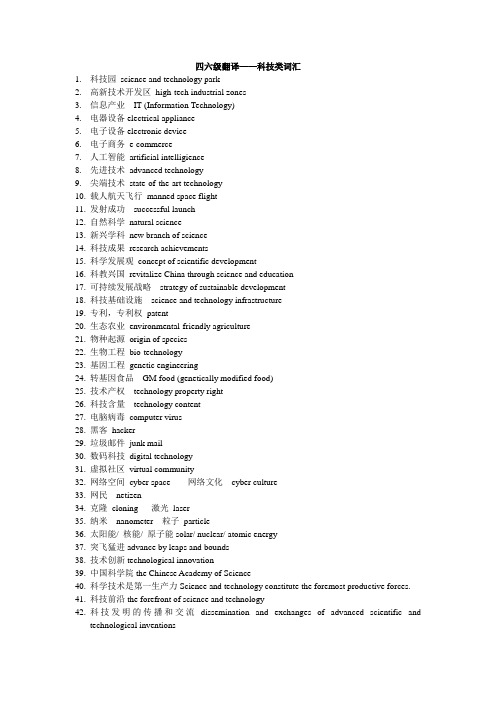
四六级翻译——科技类词汇1.科技园science and technology park2.高新技术开发区high-tech industrial zones3.信息产业IT (Information Technology)4.电器设备electrical appliance5.电子设备electronic device6.电子商务e-commerce7.人工智能artificial intelligience8.先进技术advanced technology9.尖端技术state-of-the-art technology10.载人航天飞行manned space flight11.发射成功successful launch12.自然科学natural science13.新兴学科new branch of science14.科技成果research achievements15.科学发展观concept of scientific development16.科教兴国revitalize China through science and education17.可持续发展战略strategy of sustainable development18.科技基础设施science and technology infrastructure19.专利,专利权patent20.生态农业environmental-friendly agriculture21.物种起源origin of species22.生物工程bio-technology23.基因工程genetic engineering24.转基因食品GM food (genetically modified food)25.技术产权technology property right26.科技含量technology content27.电脑病毒computer virus28.黑客hacker29.垃圾邮件junk mail30.数码科技digital technology31.虚拟社区virtual community32.网络空间cyber space 网络文化cyber culture33.网民netizen34.克隆cloning 激光laser35.纳米nanometer 粒子particle36.太阳能/ 核能/ 原子能solar/ nuclear/ atomic energy37.突飞猛进advance by leaps and bounds38.技术创新technological innovation39.中国科学院the Chinese Academy of Science40.科学技术是第一生产力Science and technology constitute the foremost productive forces.41.科技前沿the forefront of science and technology42.科技发明的传播和交流dissemination and exchanges of advanced scientific andtechnological inventions。
农业生产科技英语
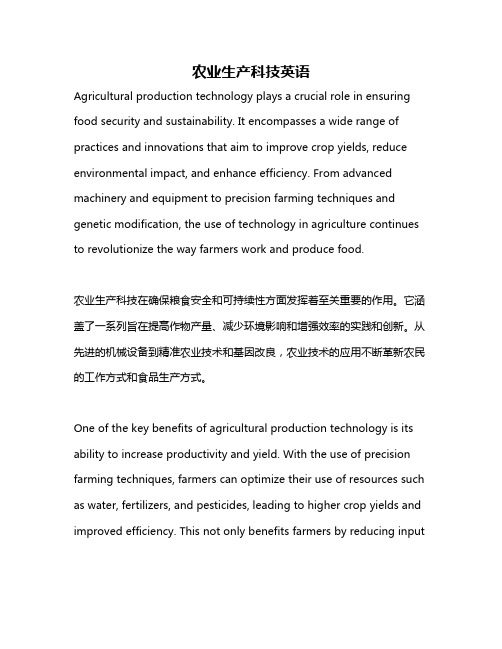
农业生产科技英语Agricultural production technology plays a crucial role in ensuring food security and sustainability. It encompasses a wide range of practices and innovations that aim to improve crop yields, reduce environmental impact, and enhance efficiency. From advanced machinery and equipment to precision farming techniques and genetic modification, the use of technology in agriculture continues to revolutionize the way farmers work and produce food.农业生产科技在确保粮食安全和可持续性方面发挥着至关重要的作用。
它涵盖了一系列旨在提高作物产量、减少环境影响和增强效率的实践和创新。
从先进的机械设备到精准农业技术和基因改良,农业技术的应用不断革新农民的工作方式和食品生产方式。
One of the key benefits of agricultural production technology is its ability to increase productivity and yield. With the use of precision farming techniques, farmers can optimize their use of resources such as water, fertilizers, and pesticides, leading to higher crop yields and improved efficiency. This not only benefits farmers by reducing inputcosts but also helps to meet the growing demand for food in a sustainable manner.农业生产技术的一大关键优势是其提高生产力和产量的能力。
农业英语词汇

中国热门科技词汇科学发展观concept of scientific development全民科学文化素质scientific and cultural qualities of the entire people 发展科技scientific and technological advancement科教兴国revitalize China through science and education 农业技术agricultural technology[扩展]白色农业 white agriculture (microbiological agriculture and biological cell agriculture)超级杂交水稻super-hybrid rice技术下乡spreading the application of science and technology in rural areas节水农业water-saving agriculture立体农业3-D agriculture农产品加工及转化the processing and commercialization of agro-products 农业科技agro-science农作物良种seeds of high-quality crop农作物新品种选育the selection and breeding of new crops 生态农业environmental-friendly agriculture无土栽培soil -less cultivationBP机,传呼beeper, pager背投屏幕rear projection screen不明飞行物unidentified flying object (UFO)操作系统operating system产品科技含量technological element of a product创新innovation电话会议teleconference电话留言机answering machine对讲机talkie and walkie多媒体multimedia二期the second phase防抱死系统ABS (anti-lock braking system)孵化器incubator高产优质high yield and high quality高技术产业化apply high technology to production高科技板块high-tech sector高科技园high-tech park个人数字助理PDA (personal digital assistant)工业园区industrial park国家质量技术监督局the State Bureau of Quality and Technical Supervision 国家重点实验室national key laboratories火炬计划Torch Program (a plan to develop new and high technology)计算机中央处理器central processing unit(CPU)技术产权technology property right技术交底confide a technological secret to someone.技术密集产品technology-intensive product交叉学科interdisciplinary branch of science科技成果转化为生产力 transfer of scientific and technological achievements into productive forces科技含量technology content科技基础设施science and technology infrastructure科技是第一生产力Science and technology constitute a primary productive for ce科技体制改革reform of the science and technology management system科技与经济脱节science and technology are out of line from the economy科教兴国rejuvenate the country through science and education可持续发展战略strategy of sustainable development纳米nanometer三峡水利枢纽工程the key water control project at the Three Gorges on the Yangtze River物种起源origin of species新兴学科new branch of science研究成果research results在孵企业incubated enterprises自动取款机automatic teller machine (ATM)自然科学与社会科学的交叉融合integration of natural and social sciencesIT 信息技术[扩展]信息港info port信息高地information highland信息高速公路information superhighway信息革命information revolution信息含量information content信息化informationization信息技术处理ITA - Information Technology Agreement 信息检索information retri办公自动化OA (Office Automation)笔记本电脑laptop / notebook / portable computer 电脑病毒computer virus电脑犯罪computer crime电子管理e-management电子货币e-currency电子商务e-business; e-commerce电子商务认证e-business certification电子邮件E-mail非对称数字用户环路ADSL (Asymmetrical Digital Subscriber Loop)高速宽带互联网high-speed broadband networks公告板BBS (bulletin board system)光盘杂志CD-ROM magazine广域网WAN (wide area net word)汉字处理软件Chinese character processing software黑客hacker计算机2000年问题Y2K problem计算机辅助教育CAI -computer assisted instruction计算机辅助设计CAD-computer assisted design计算机合成制造CAM-computer assisted manufacturing计算机中央处理器CPU - central processing unit超文本传送协议hypertext transfer protocol (HTTP)界面interface金融电子化computerized financial services局域网LAN - local area network互联网服务提供商ISP (Internet Service Provider)全球移动通信系统(全球通)global system for mobile communications (GSM)刻录机CD burner宽带接入broadband access宽带网broadband networks内联网、局域网(计算机)Intranet垃圾邮件junk mail千年问题、千年虫millennium bug; Y2K bug 人工智能AI - artificial intelligence人机交互human - computer interaction人机交互human-computer interaction虚拟人visual human虚拟网virtual net虚拟网virtual net虚拟现实virtual reality虚拟银行virtual bank因特网服务提供商ISP- internet service provider万维网World Wide Web(WWW)应用软件internet applications域名domain在线on line掌上电脑palm computer政府上网工程Government Online Project只读存储器read-only-memory (ROM)智能感知技术perceptive technology智能终端intelligent terminal中文信息处理系统Chinese information processing system数码科技digital technology高保真Hi-Fi (High Fidelity)高清晰度电视high definition TV (HDTV)光谷optical valley光通讯optical communication蓝光光盘Blue -ray Disc数码港cyber port数字地球digital globe数字蜂窝移动通信digital cellular mobile telecommunications三维电影three-dimensional movie三维动画three-dimensional animation[详析] “蓝光光盘”利用蓝色的激光束来刻录数据。
现代农林英语单词

现代农林英语单词现代农林英语单词大全是一个包含与现代农业和林业相关的英语词汇的详尽列表。
这些词汇涵盖了从农业和林业实践到相关科学、技术和管理方面的各个方面。
以下是一份简要的现代农林英语单词大全:1. 农业相关词汇:Agriculture: 农业Crop: 庄稼,农作物Harvest: 收获Irrigation: 灌溉Fertilizer: 肥料Pest control: 害虫控制Crop rotation: 农作物轮作Greenhouse: 温室2. 作物名称:Wheat: 小麦Rice: 大米Corn: 玉米Soybean: 大豆Cotton: 棉花Potato: 土豆Tomato: 西红柿3. 林业相关词汇:Forestry: 林业Timber: 木材Logging: 伐木Deforestation: 森林砍伐Reforestation: 重新造林Forest management: 森林管理Wildlife habitat: 野生动物栖息地4. 环保和可持续发展:Sustainable agriculture: 可持续农业Agroecology: 农业生态学Conservation: 保护Biodiversity: 生物多样性Organic farming: 有机农业5. 农业科学和技术:Biotechnology: 生物技术Genetic engineering: 基因工程Precision farming: 精准农业Agronomy: 农学Horticulture: 园艺学6. 市场和贸易:Agricultural market: 农产品市场Export: 出口Import: 进口Trade balance: 贸易平衡这只是一个简要的概述,实际上现代农林英语单词大全可能更为庞大。
这些词汇涵盖了从生产到管理、科学、市场和环保等多个方面,反映了现代农业和林业的综合性质。
农业科技与农业现代化英语作文
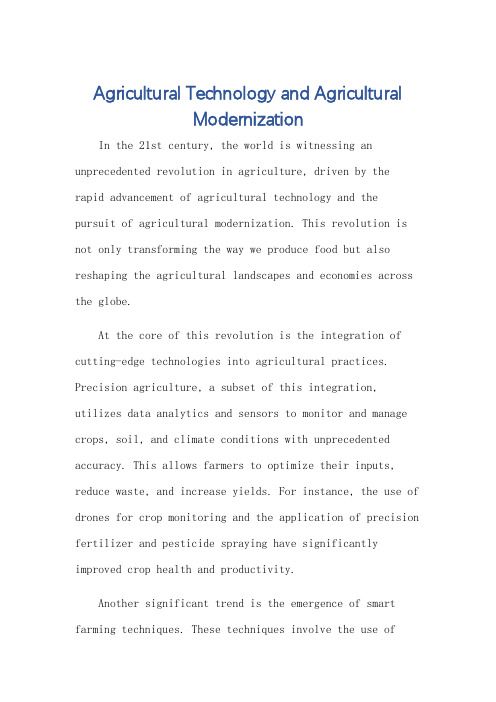
Agricultural Technology and AgriculturalModernizationIn the 21st century, the world is witnessing an unprecedented revolution in agriculture, driven by the rapid advancement of agricultural technology and thepursuit of agricultural modernization. This revolution is not only transforming the way we produce food but also reshaping the agricultural landscapes and economies across the globe.At the core of this revolution is the integration of cutting-edge technologies into agricultural practices. Precision agriculture, a subset of this integration,utilizes data analytics and sensors to monitor and manage crops, soil, and climate conditions with unprecedented accuracy. This allows farmers to optimize their inputs, reduce waste, and increase yields. For instance, the use of drones for crop monitoring and the application of precision fertilizer and pesticide spraying have significantly improved crop health and productivity.Another significant trend is the emergence of smart farming techniques. These techniques involve the use ofinternet-connected devices and sensors to collect and analyze data, enabling farmers to make informed decisions about crop management. Smart irrigation systems, for example, can automatically adjust water flow based on soil moisture levels, thereby conserving water and ensuring optimal crop growth.Moreover, the development of biotechnology and genetic engineering has opened new avenues for crop improvement. Through genetic modification, scientists can enhance crops' resistance to pests and diseases, improve nutritional value, and even increase yields. These advances have the potential to significantly improve food security and agricultural sustainability.However, the rapid pace of technological advancements also poses challenges. Farmers need to be equipped with the necessary skills and knowledge to effectively use these technologies. Additionally, there are concerns about the potential environmental and ethical implications of some of these technologies, especially in the realm of genetic modification. Therefore, it is crucial to ensure thatagricultural technology is developed and applied in a responsible and sustainable manner.Agricultural modernization, on the other hand, is a broader concept that encompasses not only technological advancements but also changes in agricultural policies, institutions, and markets. It involves the transition from traditional, subsistence-oriented agriculture to a more market-oriented, productive, and efficient system. This transition is driven by a range of factors, including population growth, urbanization, and changes in consumer preferences.In the context of agricultural modernization, technology plays a pivotal role. It helps to increase agricultural productivity, reduce costs, and improve the quality of agricultural products. This, in turn, enables farmers to earn higher incomes and invest in further improving their farms. At the same time, agricultural modernization also involves the development of infrastructure, such as roads and irrigation systems, and the establishment of efficient markets for agricultural products.It is worth noting that agricultural modernization does not mean abandoning traditional agricultural practices or ignoring the needs and preferences of rural communities. On the contrary, it should be a process that respects and builds on local knowledge and resources while incorporating modern technologies and practices.In conclusion, agricultural technology and agricultural modernization are intertwined processes that are transforming the agricultural sector globally. While technological advancements are opening new possibilitiesfor increasing productivity and efficiency, agricultural modernization is providing the necessary framework and infrastructure to support these advancements. However, itis important to ensure that these processes are implemented in a responsible and sustainable manner, taking into account the needs and preferences of farmers and rural communities, as well as the potential environmental and ethical implications.**农业科技与农业现代化**21世纪,世界正经历着一场前所未有的农业革命,这场革命由农业科技的迅速发展和农业现代化的追求所驱动。
科技在农业中的英语作文
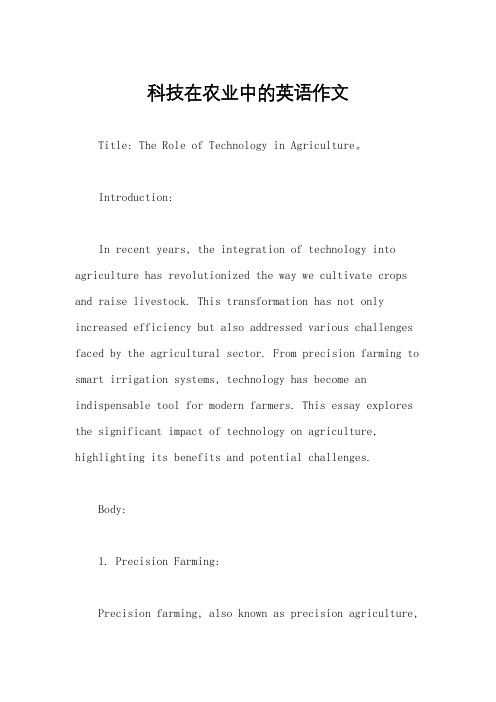
科技在农业中的英语作文Title: The Role of Technology in Agriculture。
Introduction:In recent years, the integration of technology into agriculture has revolutionized the way we cultivate crops and raise livestock. This transformation has not only increased efficiency but also addressed various challenges faced by the agricultural sector. From precision farming to smart irrigation systems, technology has become an indispensable tool for modern farmers. This essay explores the significant impact of technology on agriculture, highlighting its benefits and potential challenges.Body:1. Precision Farming:Precision farming, also known as precision agriculture,involves the use of advanced technologies to optimize crop yields and minimize input resources such as water,fertilizer, and pesticides. One of the key technologiesused in precision farming is Geographic Information Systems (GIS), which allows farmers to analyze and manage spatial and temporal variability in crop growth and soil conditions. By utilizing data collected from satellites, drones, and sensors, farmers can make informed decisions regarding planting, irrigation, and pest control, leading to higher productivity and profitability.2. Smart Irrigation Systems:Water scarcity is a significant concern in agriculture, especially in arid and semi-arid regions. Smart irrigation systems employ sensors and weather forecasts to determine the precise water requirements of crops. These systems can adjust watering schedules based on real-time data, preventing over-irrigation and water wastage. By conserving water resources and optimizing irrigation practices, smart irrigation systems contribute to sustainable agricultureand environmental conservation.3. Agricultural Drones:Drones have emerged as valuable tools for monitoring crop health and assessing field conditions. Equipped with cameras and sensors, agricultural drones can capture high-resolution images of farmland, allowing farmers to detect early signs of disease, nutrient deficiencies, and pest infestations. Moreover, drones enable farmers to surveylarge areas of land quickly and efficiently, facilitating timely interventions and decision-making. The use of drones in agriculture not only improves productivity but also reduces the need for manual labor and pesticide usage.4. Automated Machinery:The advent of automated machinery has transformed agricultural operations, reducing labor costs andincreasing efficiency. Modern tractors, harvesters, and planters are equipped with GPS technology and autonomous capabilities, enabling precise and uniform field operations. Automated machinery can perform tasks such as planting,spraying, and harvesting with minimal human intervention, saving time and labor while enhancing productivity. However, the high initial investment required for such machinery may pose a barrier to adoption for small-scale farmers.5. Biotechnology and Genetic Engineering:Biotechnology and genetic engineering haverevolutionized crop breeding and improvement, leading tothe development of genetically modified (GM) crops with desirable traits such as pest resistance, drought tolerance, and increased yield potential. GM crops can help address food security challenges by enhancing crop productivity and resilience to environmental stresses. However, concerns regarding the safety and long-term effects of GM crops on human health and the environment remain contentious issues, requiring stringent regulations and ethical considerations.Conclusion:In conclusion, technology plays a crucial role in modern agriculture, offering innovative solutions toenhance productivity, sustainability, and profitability. From precision farming techniques to advanced machinery and biotechnological innovations, the integration of technology has revolutionized traditional farming practices. However, to realize the full potential of agricultural technology,it is essential to address challenges such as access to technology, cost-effectiveness, and environmental concerns. By embracing technological advancements responsibly, we can build a more resilient and sustainable agricultural sector to meet the growing demands of a global population.Word Count: 543。
- 1、下载文档前请自行甄别文档内容的完整性,平台不提供额外的编辑、内容补充、找答案等附加服务。
- 2、"仅部分预览"的文档,不可在线预览部分如存在完整性等问题,可反馈申请退款(可完整预览的文档不适用该条件!)。
- 3、如文档侵犯您的权益,请联系客服反馈,我们会尽快为您处理(人工客服工作时间:9:00-18:30)。
What Is BiologyThe science of biology is, broadly speaking , the study of living things.It draws on chemistry and physics for its foundation and applies these basic physical laws to living things. Because there are many kinds of living things, there are many special areas of study in biology. Practical biology—like medicine, crop science, plant breeding, and wildlife management –is balanced by more theoretical biology—such as medical microbiological physiology, photosynthetic biochemistry, plant taxonomy, and animal behavior (ethology). There is also just plain fun biology like insect collecting and bird watching. Specifically, biology is a science that deals with living things and how they interact with all of the things around them.Biology was defined as the science that deals with livings. But what does it mean to be alive? You would think that a biology textbook could answer this question very easily. However, this question is more than just a theoretical one, since it has become necessary in recent years to construct some legal definitions of what life is and especially when it begins and ends. The legal definition of death is important since it may determine whether or not a person will receive life insurance benefits or if body parts may be used in transplants. In case of heart transplants, the person donating the heart may be legally ―dead ‖, but the heart certainly isn’t since it can be removed while it still has ―life‖. In other words ,there are different kinds of death. There is the death of the whole living unit and the death of each cell within the living unit. A person actually ―dies‖ before every cell has died. Death ,then, is the absence of life, but that still doesn’t tell us what life is. At this point, we won’t try to define life but will describe some of the basic characteristics of living things.生物科学,广泛的说,即是对活的生物的研究。
它利用化学和物理学为基础并将这些自然法则应用到生物中。
.由于生物多样性的存在,生物学中有很多特殊的研究领域。
一些实用生物学,例如医学,作物学,植物育种学和野生动物管理学,已经同很多例如医学微生物生理学,光合生物化学,植物分类法,动物行为学的理论生物学形成均势。
还有一些仅仅由兴趣产生的简单的生物学,像昆虫收集和观察鸟类。
具体来讲,生物学是研究生物以及生物与生物及生物与环境之间相互作用的科学。
生物学被定义为研究活的生物体。
那就意味着必须得是活的物体么?你可能会认为一本生物学课本可以很简单的回答这个问题。
然而,最近几年,在创立一些合法的定义例如什么是生命,特别是何时为生何时为死方面,这个问题已经成为了必需的部分,因此,它已经不仅仅是理论问题了。
法律对死的定义很重要,它将决定一个人是否能够获得人寿保险的赔偿或者一个身体器官是否可以用于移植。
以心脏移植为例,捐献心脏的人必须是法律上的死亡,但是既然能够移植,心脏肯定不是死的,所以它还是“活”的。
换句话说,死亡可以有很多种。
有些是所有的生命单位都死亡,还有生命单元中的每个细胞都死亡。
一个人的其实在所有的细胞都死亡之前已经死了。
死亡,生命的缺失,但仍没有告诉我们什么是生。
因此,我们不会试图定义什么是生,但会描述活的生命的一些基本特征。
The Value of BiologyTo a great extent, we owe our current high standard of living to biological advances in two areas: food production and disease control. Plant and animal breeders have developed plants and animals that provide better sources of food than the original varieties. One of the best examples of this is the various changes that have occurred in corn. Corn is a grass that produces its seed on a cob. The original corn plant had very small ears that were perhaps only three or four centimeters long. Through selective breeding, varieties of corn with much larger ears and more seeds per cob have been produced. This has increased the yield greatly. In addition, the corn plant has been adapted to produce other kinds of corn, like sweet corn and popcorn..Corn is not an isolated example. Improvement in yield have been brought about in wheat, rice oats, and other cereal grains. The improvements in the plants, along with changed farming practices(also brought about through biological experimentation),have led to greatly increased production of food.Animal breeders have also had great successes. The pig, chicken, and cow of today are much different animals from those available even one hundred years ago. Chickens lay more eggs, dairy cows give more milk, and beef cattle grow faster. All of these improvements raise our standard of living. One interesting example is the change in the kinds of hogs that are raised At one time, farmers wanted pigs that were fatty. The fat could be made into lard, soap, and a variety of other useful products. As the demand for the fat products of pigs began to decline, animal breeders began to develop pigs that gave a high yield of meat and relatively little fat. Today, plant and animal breeders can produce plants and animals almost to specifications.在很大程度上,我们应把当前我们高标准生活中先进的生物领域规为两大领域:食品生产和疾病治理。
动植物繁殖者们已经开始培育新的动植物了,这些新培育的动植物可以比原来的种类更好的提供食物来源。
最好的一个例子就是发生在玉米上的各种各样的变化。
玉米是一种禾草,它的产物是种子,长在玉米穗轴上。
原始玉米的穗很小,大概只有3到4厘米长。
通过有选择性的繁殖,各种各样的玉米有了更长的穗和每个穗轴上产出了更多的种子。
